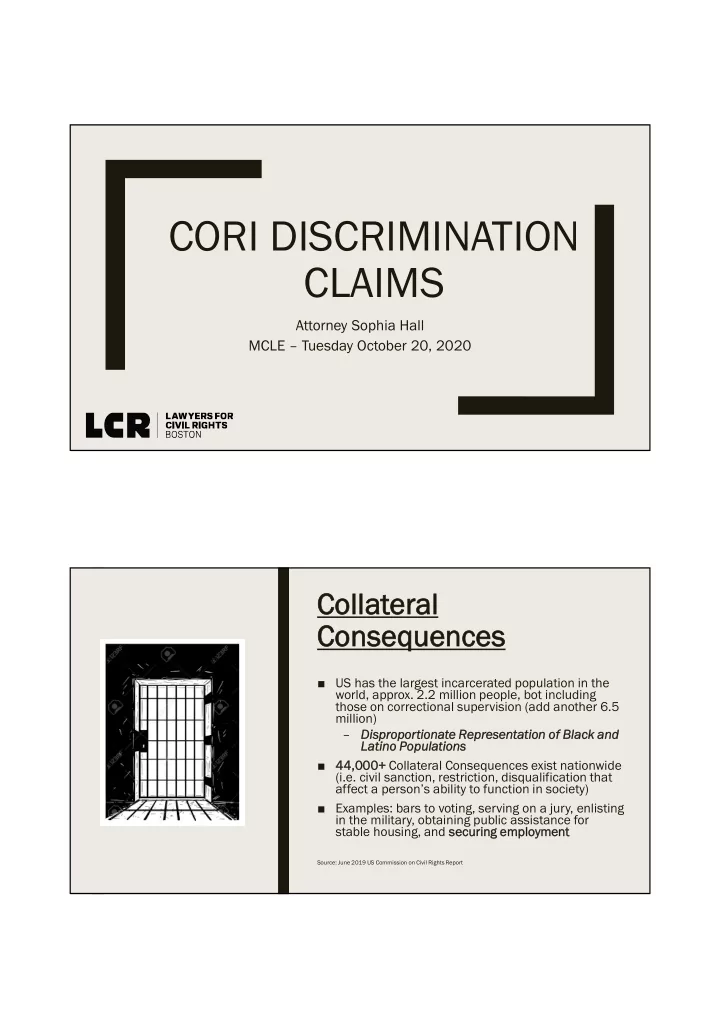

CORI DISCRIMINATION CLAIMS Attorney Sophia Hall MCLE – Tuesday October 20, 2020 Collat ateral al Consequences ■ US has the largest incarcerated population in the world, approx. 2.2 million people, bot including those on correctional supervision (add another 6.5 million) – Disprop opor ortion ionate Representatio ion of Black and Latin ino Popula lation ions ■ 44,0 ,000+ Collateral Consequences exist nationwide (i.e. civil sanction, restriction, disqualification that affect a person’s ability to function in society) ■ Examples: bars to voting, serving on a jury, enlisting in the military, obtaining public assistance for stable housing, and securin ing employmen ent Source: June 2019 US Commission on Civil Rights Report
1. Federal Law – Title VII of the Civil Rights Act 2. State Law - G.L. c. 151B 3. EEOC Guidance All of the above author orities es prohibit the disc scriminator ory use of individual criminal histories when making employment decisions at any stage of employment, including screening and hiring Reasoning C RIMINAL RECORD RD EXCLUSIONS NS HAVE A DISPARA RATE IMPACT ON SPECIFIC RACES Disparate treatment: treats criminal history records differently depending on the protected class of the applicant Dis Disparate impact: facially neutral policy that disproportionately excludes applicants with criminal records from employment
Dispara rate Trea eatmen ment Example Temp Agency Reviews 2 Applicants Rober ert (Blac ack) John (White) ■ College Grad ■ College Grad ■ 5 years of relevant work experience ■ 5 years of relevant work experience ■ Pled guilty to a marijuana ■ Pled guilty to a marijuana possession charge in high school possession charge in high school Did Not Refer for Refer for Interview Interview “Youthful “Drug Dealer Type” Indiscretion” Disparate Impact - Flow Chart Griggs v. Duke Power Company , 401 U.S. 424 (1971): SCOTUS first recognized that Title VII permits disparate impact claims ∆ Burden Π Burden Identify PPT PPT has a DI Job Related Π Burden ∆ Burden Less Business Discriminatory Necessity Alternative
LCR Case Examples: ■ Jones es v. City of Boston on – LCR’s long-running case against BPD for its discriminatory drug “hair test” policy that relies on a test that is unreliable and discriminatory. ■ Andrews, et et. al. v. Amazon on – LCR’s class action lawsuit against Amazon, for its overly-stringent background check practices that disparately impact Black and Latino drivers. ■ Gregor ory v. EEC – LCR’s most recent class action lawsuit against the MA Dep’t of Early Education & Care (EEC) challenging the unconstitutional and discriminatory use of overly-broad employment background checks that resulted in the termination of hundreds of Black childcare workers. – Same analysis can be applied to occupational licensing boards! Gregory v. EEC EEC used decades-old juvenile • records as a basis for a lifetime-ban No due process or individualized • review Disparate Impact • Black youth in MA are 10x more • likely to be incarcerated as compared to white youth, a disparity that grew by 66% from 2001 to 2015. See Black Disparities in Youth Incarceration, The Sentencing Project (Sept. 12, 2017).
What are criminal histor ory records? s? ■ Court Records; Law Enforcement and Correction Agency Records; State Criminal Record Repositories; FBI Criminal Record Repositories; etc. ■ Issue of incomplete or inaccurate records – 2006 AG Report estimated that 50% of FBI records are incomplete or inaccurate ■ MA Recognizes That Not All Records are Created Equal – Arrest records versus Conviction records and Stale Records – Use of CWOFs in Hiring Decisions (Ex. Finklea Bypass Case) ■ Recent studies show that 92% of employers use some type of criminal background check system Legal Protections/Solutions ■ Ban the Box ■ Illegal for an Employer or Other Screener (i.e. landlord, occupational licensure, etc.) to Request an Applicant Provide their CORI ■ Employer or Other Screener Must Provide a Copy of the CORI Before Inquiry About an Entry – If an entry was sealed, Applicant can answer “No” when asked if he/she has a record. G.L. c. 276, § 100A ■ Similarly, if an Applicant is Rejected Due to a CORI, an Employer or Screener Must Provide a Copy of the CORI and Information About How to Make Corrections
Doe v. Bd. of Registration in Med. , 485 Mass. 554 (2020) ■ Facts: John Doe physician was arrested, reported his arrest to his employer, then applied to renew his medical license with the Board of Registration in Medicine. As the Board was investigating, Doe acted to seal his record. Sued for reliance on the sealed record and the disclosure of the sealed record. ■ Holding: The Board was a “governmental licensing agency,” rather than a criminal justice agency, and thus was not entitled to access sealed records of closed criminal proceedings that resulted in a nolle prosequi or a dismissal in its disciplinary proceedings. Smith v. Home Health Sols., Inc. , No. CV 17- 30178-MGM, 2018 WL 5281743, at *1 (D. Mass. Oct. 24, 2018) ■ Facts: Plaintiff alleged Defendant did not hire her after it ran a CORI that showed she was arrested in 2007. The arrest did not lead to a conviction. Plaintiff brought a race-based employment discrimination action. ■ Holding: Case survived motion to dismiss and held that Plaintiff was entitled to discovery. Like in Wells Fargo , Defendant's reliance on a business necessity defense— i.e. , Massachusetts law requires Defendant to obtain “all available” CORI for applicants who will provide in-home care and treatment for elderly and disabled individuals—is premature.
Recommend
More recommend